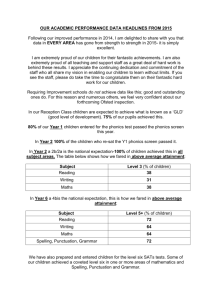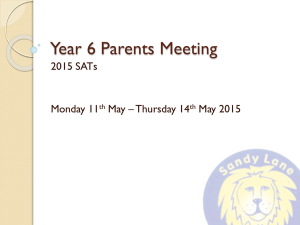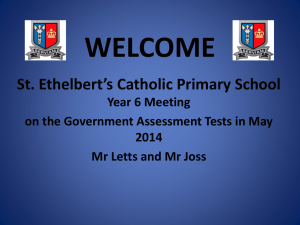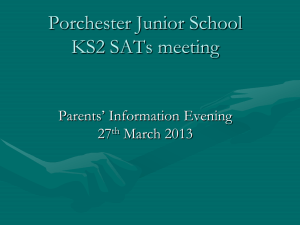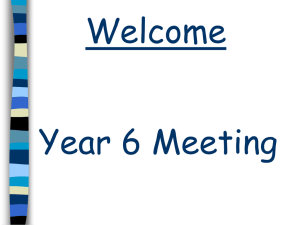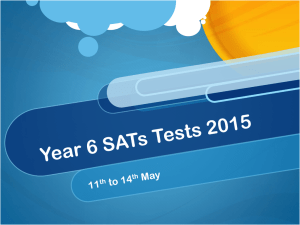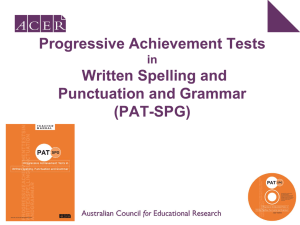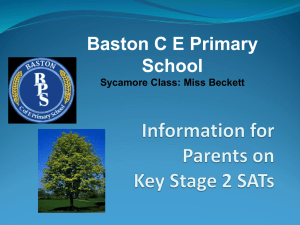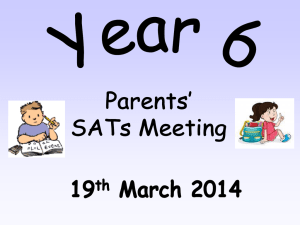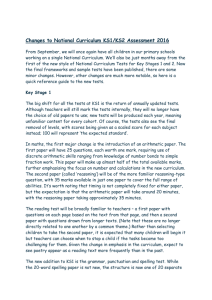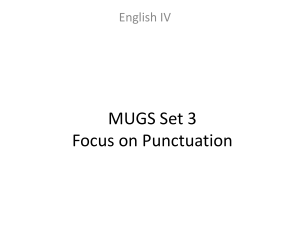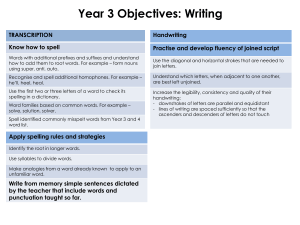Walsgrave C of E Primary School - Walsgrave Church of England
advertisement
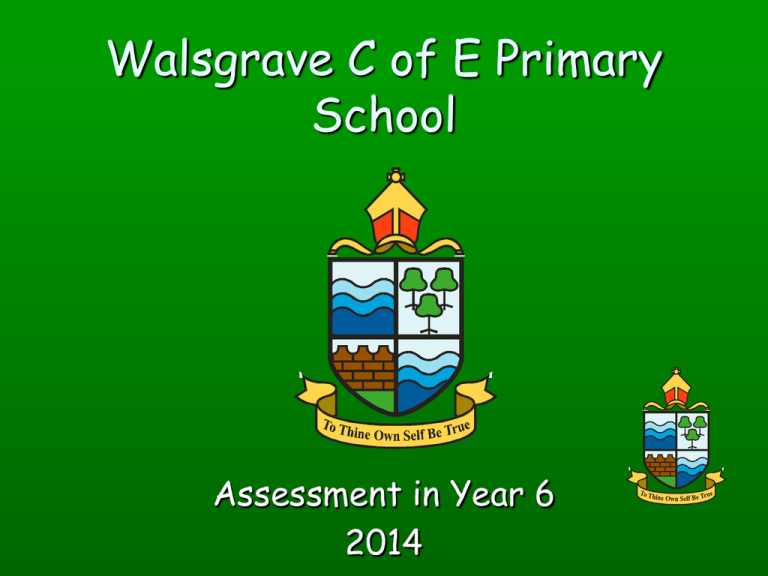
Walsgrave C of E Primary School Assessment in Year 6 2014 Aims To look at assessment throughout your child’s education To explain the assessment process in Year 6 To explain how you can help! Assessment Through a School Career Foundation Stage Foundation Stage Profile Key Stage One (Yr2) Statutory Assessment Key Stage Two (Yr6) Statutory Assessment Key Stage Three (Yr9) Teacher Assessment Key Stage Four (Yr10&11) GCSE Expected Levels? National benchmark for average Yr2 pupil is level 2B Expected progress is one level every two years (e.g. Yr2 = 2A, Yr4 = 3A, Yr6 = 4A) National benchmark for average Yr6 pupil is level 4B (Level 5B= national expectations for end of Year 8. Level 6 is roughly equivalent to Grade C at GCSE – an exceptional grade!) Available tests – Level 3-5 and Level 6 Which subjects are assessed? English Grammar, Punctuation and spelling (New to 2013) Reading (written comprehension) Writing (short task and long task – internally moderated) Maths (Test A – non-calculator, Test B – calculator, mental maths) Science – No formal Test. Teacher Assessment – Knowledge Base tests across the year Investigation Skills assessed as part of Science Week When are subjects assessed? Week beginning 12th May 2014 – Monday to Thursday. Monday Reading (Level 3-5 am) Reading (Level 6 pm) Tuesday English grammar, punctuation and spelling tests (Level 3-5 am) English grammar, punctuation and spelling tests (Level 6 pm) Wednesday Mental Maths (Level 3-5) Maths Paper A (Level 3-5) Thursday Maths Paper B (Level 3-5 am) Maths paper 1 & 2 (Level 6 pm) When are subjects assessed? Writing: The final level for writing will be teacher assessed and will be based on the timed writing tests and assessments that have taken place throughout the year. Any children who are consistently working at a high level 5 will complete a level 6 writing task in the week prior to the SATs Writing example questions An example of the different tasks that the children may be asked to write. Remember there are two writing activities – a longer write and a short write! English Reading – 50 marks possible 15 minutes reading then 45 minutes to answer questions Children may keep the booklet and SHOULD refer to it when answering questions Different types of questions Multiple choice Sentence completion Information in a table More detailed answers gain up to 3 marks Literal retrieving of information from text, inference, deduction, comment on structure or layout of text, writer’s use of language, viewpoint, social or historical context of writing. Reading example questions An example of the types of questions that the children will be asked to answer – remember there are 1, 2 or 3 marks available for each question! English: Grammar Levels 3-5 The test covers: Sentence grammar, punctuation, vocabulary, handwriting and spelling Paper 1 – Grammar, Punctuation and Vocabulary: Short Answer Questions – 45 minutes long comprising of multiple choice or short answer (one or 2 words) Paper 2 – Spelling – 20 sentences with one word missing. The children hear each word 3 times – once on its own, then within the sentence and then on its own again. No timings but should last approx 15 mins English: Grammar Level 6 The test also covers: Sentence grammar, punctuation, vocabulary, handwriting and spelling but is spread over 3 papers. Paper 1 –Extended Task: 30 minutes long. Children are given a writing task (similar to the old style writing tasks) They will be expected to use appropriate, varied sentence structures, a broad range of punctuation to control their writing and imaginative and precise words to convey meaning – They are not marked on spelling. Paper 2 – Grammar, Punctuation and Vocabulary: Short Answer Questions – 20 minutes long comprising of multiple choice or short answer (one or 2 words) Paper 3 – Spelling – 15 sentences with one word missing. The children hear each word 3 times – once on its own, then within the sentence and then on its own again. No timings but should last approx 10 mins RIM Grammar example questions An example of the types of questions that the children will be asked to answer – remember there are 1, 2 or 3 marks available for each question! Mathematics Mental Maths – 20 marks possible 5, 10 and 15 second questions Recorded on CD No stopping allowed – each question read twice Children may and SHOULD use jottings Test A – 40 marks possible Written paper – no calculator allowed Emphasis on written calculations 45 minutes Test B – 40 marks possible Written paper Emphasis on operation and methods 45 minutes Mathematics example questions 1. Here are three bags in a shop A B C £ 11.50 £ 14.65 £ 16.50 How much does bag B cost to the nearest pound? £ Mathematics example questions 2. Write in the missing numbers. One has been done for you. Mathematics example questions 3. Write the answer to each of these calculations rounded to the nearest whole number. One has been done for you. To the nearest whole number 75.7 × 59 7734 ÷ 60 772.4 × 9.7 20.34 × (7.9 – 5.4) 4466 What happens to the tests and results? Externally moderated tests are sent away to be marked Results and papers are returned at the end of June. We have a right of appeal against questionable marking Reported to parents in school report alongside teacher assessment in July – whole level only! Passed on to secondary schools (alongside teacher assessments) Used to create ‘League Tables’ and forms part of how a school is judged. How do we help? Revision programme Homework – Maths and English weekly Extra help during tests Readers – 1:1 (must fit strict criteria) Readers – words can be read to all children in maths – no explanations or spellings Extra time (rarely given! – strict criteria) Amanuensis – scribe (also rare!) Transcription for handwriting that is difficult to read Practice tests so less intimidating in test week. How can you help? Good attendance and punctuality Enough sleep Support with homework Communication with school – tell us about worries sooner rather than later! Breakfast club during SAT week! Balance of work and play NO HOLIDAYS! (during school time) How can you help? Revision/Homework Books www.bbc.co.uk/schools/bitesize www.gridclub.com http://www.parentscentre.gov.uk/forag egroup/7to11years/testsage11/ Please only download past papers prior to 2007! Any questions?
